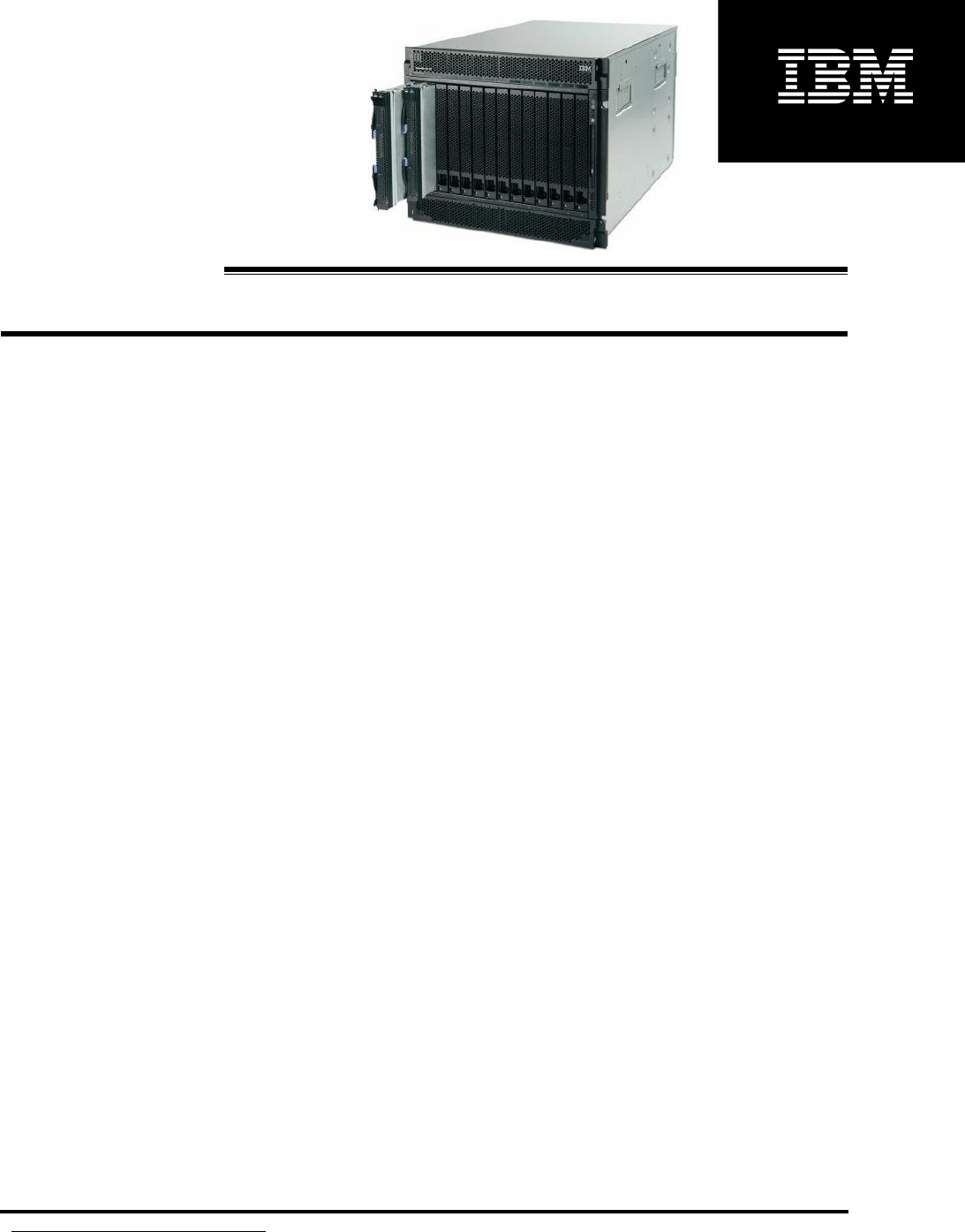
Workhorse 2-socket dual and quad-core
Intel Xeon blade server
Please see the Legal Information section for important notices and information.
1.
Product Guide
November 2006
IBM BladeCenter HS21
Product Overview
CONTENTS
Product Overview
1
Selling Features
2
Key Features
4
Key Options
12
HS21 Images
13
HS21 Specifications
13
BladeCenter Images
16
BladeCenter Specs
16
BladeCenter H Images
17
BladeCenter H Specs
18
BladeCenter T Images
19
BladeCenter T Specs
19
The Bottom Line
20
Server Rec. Map
22
For More Information
23
Legal Information
23
Uncompromising 2-socket blade server for business-
critical or telecommunications applications
[Suggested uses: Front-and mid-tier applications requiring high performance, enterprise-class
availability and extreme flexibility and power efficiency.]
Today’s data center environment is tougher than ever. You are looking to reduce IT cost,
complexity, space requirements, power consumption and heat output, while increasing flexibility,
utilization and manageability. Incorporating IBM X-Architecture
™
features, the IBM
®
BladeCenter
®
HS21 blade server, combined with the various BladeCenter chassis, can help
you accomplish all of these goals.
Reducing an entire server into as little as .5U of rack space does not mean trading away
features and capabilities for smaller size. Each HS21 blade server offers features comparable to
many 1U rack-optimized full-featured servers: The HS21 supports up to two of the latest full-
performance/low-power-draw quad- and dual-core Intel
®
Xeon
®
processors. The Xeon
processors are designed with 4MB (dual-core) or 8MB (quad-core) of L2 cache, a leading-edge
1066 or 1333MHz front-side bus (FSB), and 64-bit extensions (EM64T), to help provide the
computing power you require to match your business needs and growth
. The HS21 supports up
to 32GB of 667MHz PC2-5300 Fully Buffered ECC (Error Checking and Correcting) double
data rate II (DDR2) memory in 8 DIMM slots, using the Memory and I/O Expansion Unit, with
optional Chipkill
™
protection, for high performance and reliability. The base HS21 is packaged
into a single 30mm form factor and supports up to 16GB of memory in 4 DIMM slots.
Integrated dual Gigabit Ethernet
1
controllers are standard, providing high-speed data transfers
and offering TOE (TCP Offload Engine) support, load-balancing and failover capabilities. The
Memory and I/O Expansion Unit provides two additional Gigabit Ethernet controllers (without
TOE support). Via optional expansion cards, each blade can also connect to additional Ethernet,
Myrinet, Fibre Channel, iSCSI, InfiniBand
™,
and other high-speed communication switches
housed in the chassis. Optional 2-port Expansion Cards add additional fabrics to the HS21
server as needed. This blade is designed with power management capability to provide the
maximum uptime possible for your systems. In extended thermal conditions or power
brownouts, rather than shut down completely, or fail, the HS21 automatically reduces the
processor frequency to maintain acceptable thermal and power levels.
All HS21 models offer impressive features at an equally impressive price, including up to two
SAS hard disk drives, with RAID-0 data striping or RAID-1 disk mirroring support. An optional
30mm Storage and I/O Expansion Unit connects to a blade (model-dependent) to provide an
additional three 2.5” SAS HDDs with hot-swap support, optional RAID-5 with battery-backed
cache, and four additional communication ports. Moreover, the HS21 is optimized for
diskless operation, offering each blade server access to essentially unlimited storage capacity
via Fibre Channel or iSCSI.
A single BladeCenter or BladeCenter H chassis supports up to 14 hot-swappable 30mm-wide
HS21 blades in only 7U (BladeCenter) or 9U (BladeCenter H) of rack space or up to 8 hot-
swappable blades in the rugged 8U BladeCenter T chassis. Plans call for supporting up to 8
HS21 NEBS-3/ETSI-compliant blades in a telecommunications environment. In addition to the
blade servers, these chassis also hold up to four (BladeCenter/BladeCenter T) communication
switches, or up to ten switches/bridges (BladeCenter H) internally. Not only can this save
significant data center space (and therefore the cost of floor space and rack hardware)
compared to 1U servers, it also consolidates switches/bridges and cables for reduced
complexity and lower cabling costs, and allows clients to manage everything in the solution as
one. Using a BladeCenter chassis, up to 84 HS21 servers (168 processors) can be installed in
one industry-standard 42U rack but the value of BladeCenter extends far beyond high density
data center environments.
1
Actual data transfer speed will vary and is often less than the maximum possible. Gigabit Ethernet transfer speed requires support on both
system and server, and appropriate network infrastructure.
